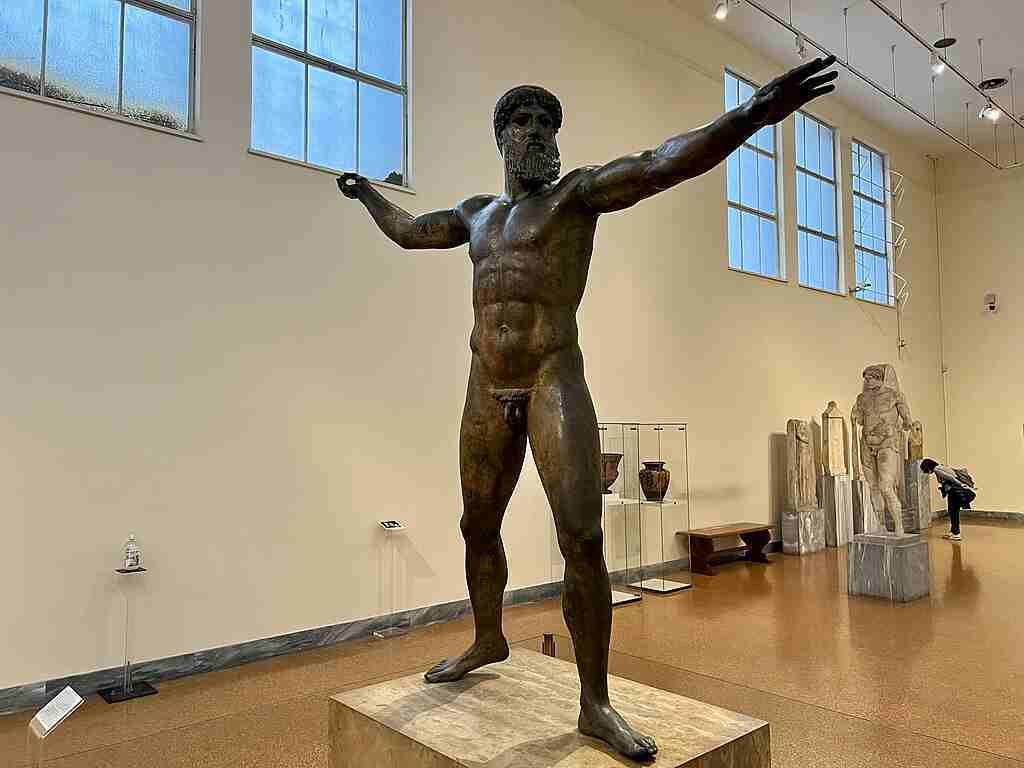What Everyone Must Know About Zeus god of Olympus
Zeus God of Olympus (Ζεύς) is the king of the Gods in Greek mythology and is named Jupiter among the Romans. He is the son of the Titans Cronos and Rhea and the brother of several gods: Hestia, Demeter, Hades, Poseidon and Hera, with whom he is married. His main functions are those of god of the sky and thunder.
King of the gods and lord of Olympus, Zeus is however not master of his passions which lead him to all sorts of adventures. Discover the portrait and secrets of Zeus.
How was Zeus born?
The birth of Zeus begins in violence. His father, Cronos, devoured all his children for fear of being dethroned by one of them. Desperate, Rhea invents a ruse to protect her youngest child, Zeus. Instead of giving the child to her husband to eat, she gives him a stone wrapped in a diape. Deposited on the island of Crete, Zeus grew up in a tree, fed with goat’s milk.
The prophecy of Ouranos – father of Cronos – comes true in the adolescence of Zeus. With the help of Metis, Cyclopes and Hecatonchires, he manages to defeat his father and becomes the master of the third generation of gods and this is the generation of the Olympians.
What are the characteristics of Zeus?
Zeus unleashes the storm and unleashes lightning. It is his most formidable weapon, offered by the Cyclops to help him dethrone Cronos. “Besides in Greek, we don’t say ‘it’s raining’ but ‘Zeus is raining’, it’s magnificent!
Who are Zeus’ enemies?
The Titans are the deities who preceded the gods of Olympus. Zeus must fight against these mythological creatures to bring order. The Titans are the tense force and Zeus represents the light which spreads, the measure and the justice, even if he himself is not very measured.
What are the adventures of Zeus?
The god of Olympus is also famous for his many adventures with goddesses, nymphs and mortals, from which will be born extraordinary demigods. A master of metamorphoses, he gladly changes his appearance to seduce.
He becomes a shower of gold to seduce Danae and takes the form of a swan for Leda queen of Sparta. But the most famous of his adventures with a mortal is that which he had with Alcmene. To charm her, Zeus metamorphoses into her husband, Amphitryon and spends the night with her,” says the specialist. From this relationship will be born a son, Heracles.
Zeus gave birth twice
Warned by Ouranos that the unborn child of his union with Metis will possess the strength of his father and the wisdom of his mother, Zeus swallows Metis, pregnant, for fear of being dethroned. On the day of the delivery, he is seized with a powerful headache, forcing him to ask Hephaestus to split his skull with an axe. Athena was born from his head, letting out a battle cry.
Zeus also gives birth to Dionysos, from his union with Semele, daughter of the king of Thebes. “Under the advice of the jealous Hera, Semele asks Zeus to appear to her so that he can contemplate him in his divine form. He complies, but Semele, pregnant, is struck down”, says the philologist. The King of Olympus pulls the child from his mistress’s womb and places him in her thigh until delivery to protect him from Hera.
It’s quite funny to think that Zeus, the king of the gods, the man par excellence, gives birth twice, once through the head and once through the thigh.
Zeus will also have to use his tricks to protect his son, the demigod Hercules (Heracles).
Verso bronze statue of Zeus. Pinterpandai.com, CC BY-SA 3.0, via Wikimedia Commons
Its functions and attributes
He presides over all atmospheric phenomena:
Master of rain (ὑέτιος, hyetios), winds (αἴητος, aiètos) and good weather (εὔδιος, eudios). Thus, he is the patron god of harvests and fruits (ἐπικάρπιος, epicarpios) as well as the dreaded master of lightning (ἀστραπαῖος, astrapaïos) who unleashes lightning (βρονταῖος, brontaïos) by shaking the aegis with a resounding noise (γ,πϯδρδρ erigdoupos). In this case, he carries the aegis, the shield used to trigger storms, and “the thunderbolt”, the staff made by the Cyclopes used to warn, punish or kill.
He is the god of the family in the broad sense:
God of the hearth (ἐφέστιος, ephestios), fences and walls (ἑρκεῖος, hercios) for houses, cities (πολιεύς, polieus) or popular assemblies (ἀγοραῖος, agoraios), guarantor of oaths and treaties (ιοκ, horciosοο, ), god of marriage (γαμήλιος, gamèlios), friendship (φίλιος, philios) and hospitality (ξένιος, xénios).
He is the guarantor of the maintenance of laws and human societies:
Protector of siblings (φράτριος, phratios), tribes (φύλιος, phylios), states or amphictyonies, i.e. associations of cities (ἑλένιος, helenios). He thus has the following adjectives as epithets: ἀλεξίκακος, alexicacos he who wards off evils and protects the weak; σωτήρ, sôtèr, savior of all suppliants. He is a model legislator for kings (ἄναξ, anax, lord / βασιλεύς basileus, king / ἀρίσταρχος, aristarchos, sovereign master). He then carries the scepter in cypress wood, symbol of his royalty held in his left hand. The oak tree is a symbol of his power and strength. Often seated on a throne. He is accompanied by the eagle, king of birds, also a symbol of power.
Warrior god:
He is the warrior god with beautiful armies (στράτιος, stratios) full of courage (Στάτωρ, stator) or cunning (δόλιος, dolios or ἀπατήνωρ, apatenor), who wins victories (νικητωρ, ς or nices , phyxios or φυξήλιος, phyxelios).
Sources: PinterPandai, Britannica, GreekMythology, Theoi
Photo credit: Pinterpandai.com (CC BY-SA 3.0) via Wikimedia Commons



